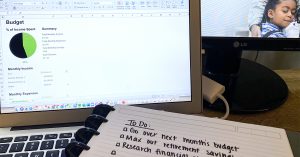Budgeting was not something my husband and I began immediately in our marriage. It was a skill we learned over time, and one that has changed not only how we manage our money in better ways, but how we plan for the future of our family.
Like many military families, we live off one salary. This is not always easy, so I wanted to share a few budgeting tips that have worked well for us since we began a couple years ago.
- Tackle your debt before your savings. My husband and I began our marriage in debt. We both had car payments that added up to almost $800 per month. At the end of each month, we found that we were able to save very minimally, if at all. It was discouraging for both of us, feeling like we were making little progress in either category; that is, paying off debts or We decided we needed to actively focus on our debt before we could think about saving; so, we endured a painful year and a half putting every extra dollar we could find towards our car payments and becoming debt-free. Once we were no longer spending that money on car payments, we found that we could pay it forward into savings and investing.
- Budget carefully and consistently. I’ve tried many budgeting tools over the years and have had most success with “zero-based budgeting”. This is a budgeting system in which you anticipate unique expenses for the upcoming month and plan where every dollar will go for that specific month — whether that be into an expense category or into savings. Your goal is to reach a balance of zero at the end of the month and plan a new budget for the next month. In other words, there is no “carryover” money into the next month. Whatever money is not used that month goes into savings. Successful budgeting takes consistency and discipline. Entering your expenses into your budgeting tool or app is a task you must commit to doing every few days to stay on top of your spending and remaining allowances.
- Anticipate your expenses. Anticipating your expenses is an important skill to develop when using a zero-based budget. You should always be thinking about the month ahead. For instance, this past September I began working on our October budget, listing any unique expenses I knew of such as a hair appointment, Halloween, hosting friends for a weekend and my husband’s promotion ceremony. I knew we would be spending more than usual that month, so I cut our spending allowance in other categories such as personal spending, family fun time and eating out. By cutting the budget in some categories, you allow room to spend more in other categories that month — with the goal of meeting your typical monthly savings goal.
- Pace yourself. Since becoming debt-free and budgeting well, my husband and I no longer live “month-to-month” like we did for those first couple years of marriage; however, we choose to. What I mean by this is that we pace our spending throughout the month, so we do not ever use our entire paycheck. We can pay off our credit card at the end of the month without dipping into savings. In fact, usually there is a good bit left to save. I like to challenge myself at the beginning of each month to spend money only on needs and buying the extras in the latter half of the month. This is helpful in preventing me from “blowing the budget” in the first week or two of the month.
- Be realistic. If you are new to keeping a budget, it will take a few months of closely monitoring your spending to be able to set up a realistic budget for yourself. I still find myself tweaking certain expense categories when I find that we are going over budget in those areas for consecutive months. Of course, there are times where instead of tweaking your budget, you need to tweak your lifestyle (we have had to do this with eating out less than we’d like to), but other times you may be going over budget because you have set unrealistic expectations for yourself.
As the popular American financial guru Dave Ramsey preaches, “A budget is telling your money where to go instead of wondering where it went.” And I really mean it when I say that creating a budget has been the best decision my husband and I have made in our marriage, and for the future of our family.





